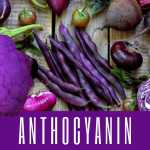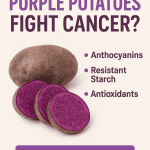🍇 What Are Muscadine Grapes?
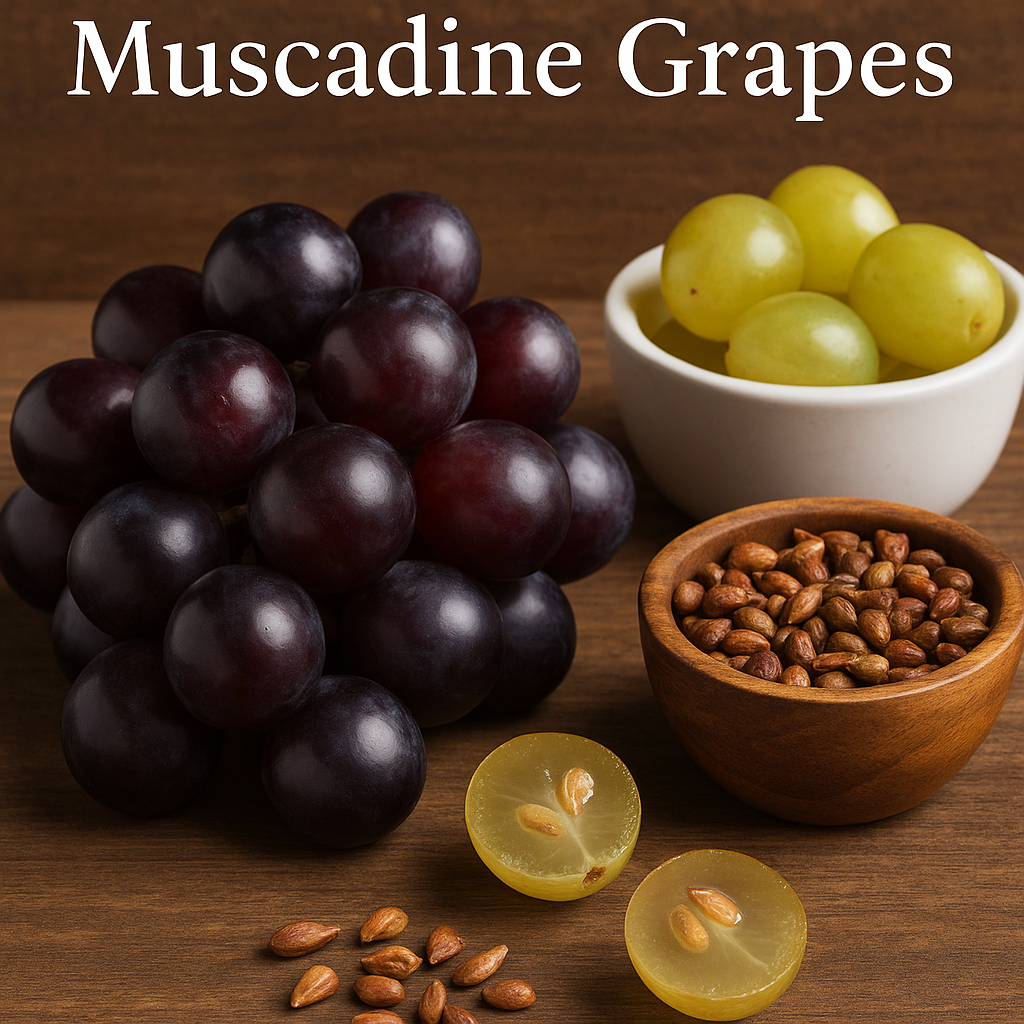
Muscadine grapes (Vitis rotundifolia) are a native American grape species that thrive in the warm, humid climate of the southeastern United States (most commonly in North Carolina). Unlike common table grapes, muscadines grow in small clusters and feature thick, robust skins that range from deep purple to bronze, depending on the variety. These skins are not just tough, they are the source of the health benefits. They’re loaded with beneficial polyphenols and antioxidants.
First cultivated by Indigenous peoples and later grown by early American settlers, muscadines are one of the few grape varieties that naturally resist pests and diseases, making them ideal for organic farming. They’re often enjoyed fresh, but are also popular in jellies, juices, wines, and health supplements.
One unique characteristic of muscadine grapes is their chewy texture and “pop” when bitten into, thanks to their thick skins and juicy interior. Inside, you’ll find a pale green to golden pulp and several seeds, each with its own concentration of nutrients and antioxidants.
Muscadines are more than just a flavorful fruit; they’re considered a “functional food,” meaning they offer nutritional benefits beyond basic nutrition. Their high levels of resveratrol, ellagic acid, and fiber make them especially valuable for anyone looking to boost their health through diet.
🌿 Polyphenols in Muscadine Grapes: What Makes Them Special?
One of the key reasons muscadine grapes stand out nutritionally is their exceptionally high polyphenol content which far exceeds that of traditional grapes like Concord or European varieties.
💎 Unique Polyphenolic Profile
Muscadines are rich in a diverse group of polyphenols, including:
- Resveratrol – Widely recognized for its anti-aging and heart-protective properties, resveratrol is found in especially high levels in the thick skins of muscadine grapes.
- Ellagic Acid – This rare and potent polyphenol is unique to muscadines among common grapes. It’s been studied for its potential anti-cancer, anti-inflammatory, and antibacterial effects.
- Anthocyanins – These pigments give dark muscadines their rich purple hue and contribute to their antioxidant and anti-inflammatory benefits.
- Quercetin and Kaempferol – Flavonols that support immune function, cardiovascular health, and cellular protection from oxidative stress.
- Tannins – Found in both the skins and seeds, tannins give muscadines their astringent bite and contribute to gut and metabolic health.
💪 Polyphenol Power: How They Benefit Health
The combination of these polyphenols creates a synergistic effect that enhances their overall bioactivity. Muscadine polyphenols have been shown to:
- Neutralize free radicals, reducing oxidative stress and lowering the risk of chronic conditions like heart disease and cancer.
- Supports heart Health, Their high antioxidant content, especially in the skins, may reduce inflammation, lower blood pressure, and improve cholesterol ratios . . . contributing to overall cardiovascular health.
- Modulate inflammatory pathways, easing systemic inflammation that contributes to aging and metabolic disorders.
- Improve vascular function, supporting blood flow and lowering blood pressure.
- Support glucose metabolism, potentially helping with insulin sensitivity and blood sugar control.
- Promote cellular repair, contributing to longevity and reduced DNA damage.
- Anti-Cancer Properties, Ellagic acid, abundant in muscadine grapes, has been studied for its potential to inhibit the growth of certain cancer cells, including those of the breast, colon, and prostate.
- Gut Health & Anti-Inflammation, The polyphenols in muscadines support the gut microbiome and may help reduce systemic inflammation, which is linked to conditions like arthritis and IBS.
These effects make muscadine grapes not just a fruit, but a true functional food.
🧬 Muscadine Grape Seeds: Tiny Powerhouses
Don’t toss the seeds!
Muscadine grape seeds are especially rich in oligomeric proanthocyanidins (OPCs), known for their potent antioxidant, anti-inflammatory, and even skin-supportive properties. These compounds may help reduce oxidative damage, support joint health, and even promote better circulation. Grape seed extract is commonly sold as a supplement for these very reasons.
🍭 What About the Carbs in Muscadine Grapes?
While muscadine grapes are rich in nutrients, they are also relatively high in natural sugars:
- Carbohydrates: About 13–15 grams of carbs per 100 grams, primarily from natural fructose and glucose.
- Glycemic Impact: They fall in the moderate range on the glycemic index, so people managing blood sugar may want to enjoy them in moderation or pair them with protein or fat to blunt glucose spikes.
That said, the high fiber and polyphenol content may help offset some of the glycemic impact by slowing absorption.
📊 Nutritional Value (Per 100g Serving)
- Calories: ~60
- Carbohydrates: 13–15g
- Fiber: 4g
- Vitamin C: 20% DV
- Manganese: 10% DV
- Polyphenols: 500–1000mg (varies by variety and ripeness)
They’re also free of fat, gluten, cholesterol, and sodium, making them a heart-healthy snack.
🍇 Muscadine vs. Scuppernong Grapes
Scuppernongs are a subtype of muscadine grapes, typically bronze or golden-green in color, while “muscadine” often refers to the darker purple varieties. Both offer similar health benefits, but:
| Feature | Muscadine (Dark) | Scuppernong (Bronze) |
|---|---|---|
| Antioxidants | Higher in resveratrol & anthocyanins | Lower in anthocyanins, still high in polyphenols |
| Flavor | Bold, slightly tart | Milder, more honey-like |
| Skin Thickness | Thick | Thick |
A Little Bit Deeper Research
There is so much to learn in the world of resveratrol, antioxidants, superfoods and wine. This is the place to start, no matter what, if you indeed are looking to maximize your health and live longer.
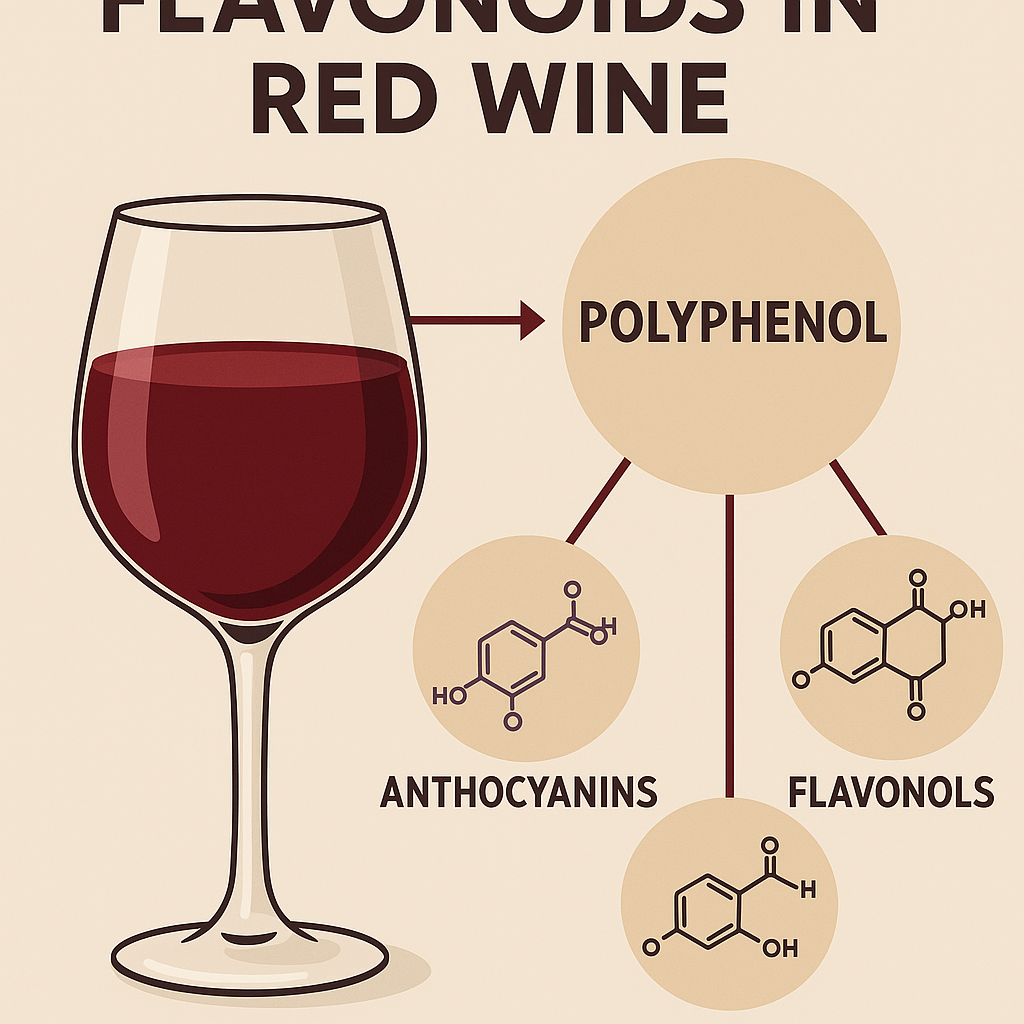 |
Flavanoids and Red Wine We have all heard that red wine is part of a healthy life, but it is important to understand the specifics of the benefits of red wine, so you can make the best of them. |
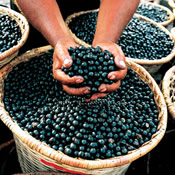 |
Does Resveratrol Extend Ones Lifespan? Harvard Medical School and the National Institute on Aging report that a natural substance found in red wine, known as resveratrol, offsets the bad effects of a high-calorie diet |
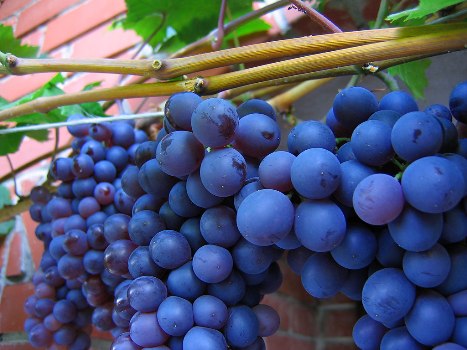 |
How Much Resveratrol is in Grapes? Resveratrol is an antioxidant that is oxidized in the presence of oxygen. The longer resveratrol is exposed, the less potent and useful it becomes. |
